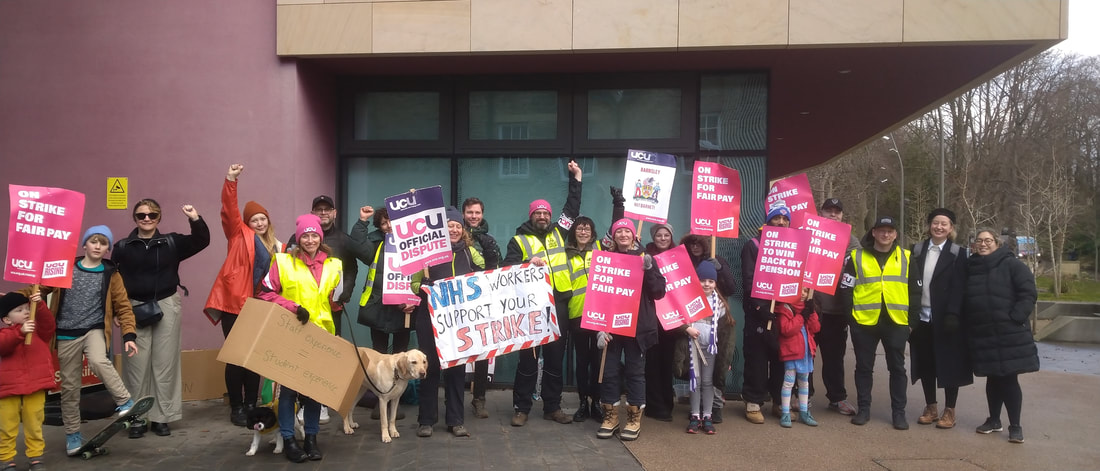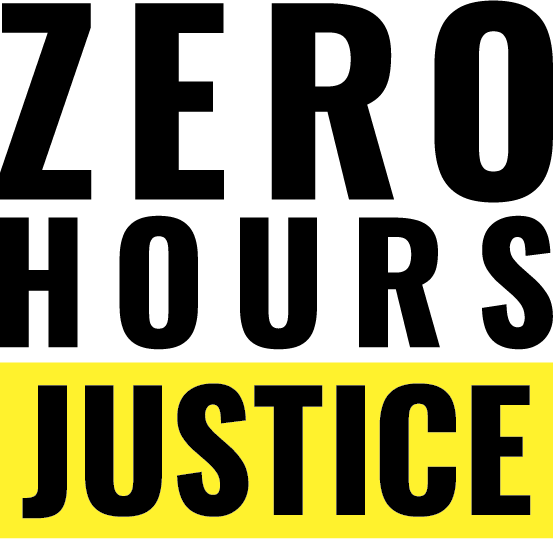Ending Zero Hours Contracts must stay firmly on the agenda - Ian Hodson, National President BFAWU20/6/2024
Some people believe that zero-hours contracts offer flexible working hours. They think that they enable them to choose the hours that suit them.
Unfortunately, many people find that this is not the reality and they are used to control workers with threats of losing hours if they say anything that contradicts the employer or raises issues around safety or even sexual harassment. Usually, the only flexibility is for the employer rather than the worker. However, there are even more unfair reasons underneath than the headlines around the so-called possible flexibility benefit issue around a zero-hours contract. When you look at the impact it has on your life, both short and long term it doesn't just impact your ability to build a secure long term future as banks and landlords are not likely to entertain you with a mortgage or rent a property due to your insecure employment and typically low pay that goes alongside it, but also the fact that if the employer you work for goes bust, they don’t have to pay your notice or redundancy and neither does the government. When you come to retire, you find that you are not entitled to your full state pension as you fell below the minimum income threshold, which means that your poverty continues even into your retirement. What's also clear is that employers like to keep zero-hour contracts because it’s good for their own wealth. In fact, the IOD, the Institute of Directors, and the CBI have been putting pressure on the Labour Party to reverse its decision to ban outright zero-hour contracts and water it down to talk about the mythical type of exploitative forms of zero-hour contracts if your boss want accept you as a worker and provides no rights they are all exploitative. Great for bad bosses, bad for workers and bad for the UK. When you look at Britain's GDP over the decades, and you look at how employment practices have changed with changes to legislation which have reduced working people's rights in the workplace, you recognise that not only has this destabilised working people's security, but it's undermined Britain's opportunity to grow its economy. Growing our economy is something politicians constantly talk about but continue to refuse to actually tackle. And the most significant contributor, job insecurity, with all the data showing undervalued workers are not as productive as workers in other countries that don’t operate a race to the bottom. Britain's GDP is at its lowest ever and shows no sign of improving to the levels of the so called bad old days of the 70s when it was growing at up to 6.5% now we are lucky if it reaches 1.5% and this should be laid at the door of the government and of business. This business model of insecure employment may have created opportunities for vast wealth for individuals at the top of the food chain, but it's done absolutely nothing for the country's economy or its people. As a country, we need to recognise that when we talk about levelling up, that means that people have secure employment, housing security, and an income that enables them to afford not just the basics of life but the ability to enjoy life which in my opinion are essential. It’s why during this election, ending zero-hours contracts has to be firmly on the agenda. We must refrain from allowing the next government to push this idea of allowing any form of exploitation of workers to continue, if a new deal is to have any real meaning we must ensure that we have rights in the workplace. We cannot accept any less for a country that is supposed to be about its people and we must put their needs first. The government of whichever colour gets elected must demonstrate that by ensuring an end to the exploitative nature of employment, and that means banning zero-hours contracts outright. The government has announced its intention to further reform the laws surrounding zero hours contracts, offering more stability to zero hours workers in the UK with the creation of the new right to request a predictable working pattern under the Workers (Predictable Terms and Conditions) Act 2023.
At present, there is no right for zero hours workers to any predictability in their working schedule, with the balance of power being very much in an employer’s favour. The new legislation seeks to combat the exploitative nature of zero hours contracts and marks a significant new step in offering stability for the UK workforce, seeking to eradicate the "one-sided flexibility” that the government identified back in 2018 as part of its review of modern workplaces. The new right to request a predictable working pattern is a milestone in the fight for workers’ rights, allowing them to formally request more stable working hours, helping to ease the uncertainty of the precarious nature of these types of contracts. Whilst it is still in the early stages, it is anticipated that the new formal process will allow workers to request either fixed hours or a regular working schedule. A new statutory ACAS Code of Practice has been published governing how employers must deal with these requests (although it is currently in draft form), but it is expected that:
Further reforms to zero hours contracts are also still being considered by the government, which could see financial penalties introduced for employers who cancel their workers’ shifts at the last minute, and the right to reasonable notice of working hours. The new legislation is anticipated to take effect from September 2024 and whilst the legislation is still in draft form, it should serve to strengthen the rights of both workers and agency workers, providing better job security across the board and compelling employers to use these contracts responsibly and fairly. We hope that these continuing developments will create a more just and equitable labour market for all. In January of this year, we assisted several workers who had their contracts at TXM terminated after the company unexpectedly went into liquidation. Members of the RMT union have been pursuing a protective award for affected employees, as the lack of consultation can result in a protective award being made to each employee of up to 90 days’ gross pay. However, zero-hours workers are not afforded the same level of protection; there is currently no right to redundancy pay or even a redundancy consultation period for them.
One worker estimated that there were more zero-hours workers than employees working for TXM, and the lack of employment rights meant many faced significant financial loss as a result of their employment being unexpectedly terminated. Of the 13 people who have requested our help, many have between 9 and 13 years of service, collectively amounting to over 100 years. Despite being on zero-hours contracts, these workers didn’t benefit from the flexibility associated with such work. They were expected to work 43 out of 56 weekends and were told that taking more than 13 weekends off in a year would have "implications," which they believed meant having their work hours cut. The impact of this is devastating, with one worker sharing: “I’ve worked for TMX for 11 years, I’ve built relationships with colleagues and then it was all gone. I’ve been loyal to the company and received no loyalty back. I worry about my collages now, have they managed to find work to support their families after so abruptly losing work? It felt like the door was slammed in my face, while employees could rely on workers’ rights, I and the other zero hours employees were left with nothing.” A YouGov poll by ACAS in 2023 found that 3 in 5 workers (61%) are unaware of the rights of people on zero-hours contracts. So, what can you do as a zero-hours worker to secure better protection? The answer is to know your rights. Firstly, it’s a myth that you can be a zero-hours worker without a contract that specifically confirms this. Many unscrupulous employers fail to provide written contracts and later claim that employees have no rights as they were engaged on a zero-hours basis. Without a contract, your employment status will be determined by a range of factors including whether you are required to provide your services personally, whether you are obligated to accept work when offered, and how much control your employer has over your activities. Even with a written contract, it’s possible to prove to an Employment Tribunal that you are actually an employee if the terms in the contract don’t reflect the reality of the work you do. While many individuals on zero-hours contracts are classified as workers, there are numerous examples of zero-hours employees; it is always worth checking your contract to see how you are referred to. If you are referred to as an employee throughout the contract, with rights outlined that are only given to employees, then you might be an employee with full employment protection. It's also important to remember that the national minimum/living wage, anti-discrimination legislation, protection from deductions from wages, pension contributions, paid holidays, and rest breaks always apply to zero-hours workers. This includes protection against detriments suffered as a result of asserting your statutory rights with your employer, with the right to bring a claim in the Employment Tribunal if you are treated badly as a result of complaining to them. If you were dismissed, while you cannot specifically claim unfair dismissal unless you are an employee, if the termination of your employment can be linked to you asserting one of the relevant statutory rights (or is discriminatory), your dismissal could be automatically unfair, and you can claim equivalent compensation for loss of earnings as a regular employee would in a standard unfair dismissal claim. The upcoming general election could see further changes to workers’ rights with a change of government. Labour has pledged to make flexible working requests a day-one right for all workers and to ban exploitative zero-hours contracts, ensuring everyone has the right to a contract that reflects the number of hours they regularly work. To ensure better protection for zero-hours workers, it's crucial to be aware of all the laws. One loophole we've recently explored is the fact that breaks in service for zero-hours workers stop the clock on their continuous service, preventing them from achieving two years of service and gaining further employment rights. It's important to assess whether you might actually be classified as an employee based on your work patterns, such as working regularly every week and rarely turning down work. Understanding your employment status and the hallmarks of being an employee can significantly impact your rights and protections. Written by Ian Hodson, National President of the Bakers, Food and Allied Workers Union
In February 2023, McDonald's was forced into signing a legally binding agreement to deal with the issues of sexual harassment. The BBC exposes the situation that far too many workers have faced, leading to Westminster investigating what is happening at McDonald's. Its UK CEO admits to now being knowledgeable of 400+ workers raising grievances since July about bullying, discrimination, and sexual harassment. He further clarified his comment about sexual harassment by saying they receive up to 1 or 2 per week, as many as 104 a year. Research carried out through the TUC showed that for every one person who comes forward, five do not. People Management magazine recently reported how McDonald's committed to working with the EHRC. A spokesman said the company had committed to:
Under questioning though the CEO conceded that this was voluntary for franchises. Most of those who find themselves becoming victims are young women, some as young as 17. Nearly all we have spoken to are on zero-hours contracts. Many explained how the power dynamic worked in one store. Workers said the manager would identify his target; at the beginning, the target would be given many hours, and then he would engage them on plans they had, such as holidays, festivals, or other events. He would then cut their hours. Hence, they struggled to afford what they intended to do. He would then offer them a lift and stop at a cash point, offering cash to help them out with an implied suggestion of what was expected in return. Many others told the BBC about the normalisation inside McDonald's of behaviors that was seen as usual: having your bum slapped, being groped, being bullied, and having sexual suggestions or comments in stores was happening daily, and if you raised this, you would be threatened with your hours cut. Working on zero hour contracts not only provides the opportunity to exploit workers, but the insecurity of the contracts means people also become vulnerable to this type of predatory behaviours. This type of behaviour should never be normalised. No one should be subjected to bullying, discrimination, or harassment. As we enter 2024, we must unite as workers and campaigners and say enough is enough. It's expected that this year will be an election year, although the government could drag it out till Jan 2025, when politicians will be looking to win your votes. But we are in this situation because political decision-making is freeing up the Labour market to make it as cheap as possible to fire and re-hire. Over the last 40 years, politicians have pushed through legislation stripping working people of their rights or protection in the workplace. Businesses must sign up for our accreditation scheme, but it is critical legislation to abolish zero hours happens, too. By Sweet Beef Theatre Company Sweet Beef is an emerging queer theatre collective. We work as a collective to explore socio-political issues that affect us, with a healthy dose of audience interaction, comedy, dance and drag. This spring, thanks to support from Zero Hours Justice, we took our show I Hate it Here on tour across the UK to regional theatres and community spaces in London, Basingstoke, Leeds, Manchester and Edinburgh.
Because of Zero Hours Justice’s support, we were able to offer free tickets to 140 zero hours contract workers and audience members who couldn’t otherwise afford to come along for every performance. For each show 10% of the tickets were given out through this FREE ticket scheme which meant the show was able to reach the people it was about!
It highlighted how much appetite there is for work to be something fulfilling and enjoyable but how rare they perceived that to be. Across the board our workshop participants gave fantastic feedback, some having never had the opportunity to do creative workshops like this before. The tour was such a success that we’re planning another tour and a run at Edinburgh Fringe in 2024.
According to the latest data from the Office for National statistics, Scotland has the highest proportion of its employed workforce on zero hours contracts of all the four nations of the UK. At 3.9% (105,000), this is higher than the UK average of 3.4% and is higher than proportion for the other parts of the UK - England (3.5%), Wales (2.8%) and Northern Ireland (1.3%). The comparision with zero hours contract in England is particularly concerning, given that the significantly larger population and employed workforce in the latter. Whilst there are more people on zero hours contracts in London (180,000), at 3.7% of the employed workforce in London, this is still a lower proportion than in Scotland - but only just. Tam WIlson, the co-ordinator to the Scottish Trade Union Congress (TUC)' Better than Zero campaign told the Morning Star: "It’s risible that Scotland now has the highest use of zero hour contracts across the UK.”. He added: Zero-hour contracts are a product of an exploitative employment model that aims to strip workers of their power and treat them as dispensable. They are not just used to cut wage costs, but also to exploit and control. It is important for zero-hour contract workers to collectivise so they can challenge poor workplace conditions collectively rather than be picked off individually. Roz Foyer, the general secretary of the Scottish TUC, has said that the latest ONS figures is proof that employment law needs to be devolved to the Scottish Parliament. However, Scotland is not the only part of the UK that should be concerned about the rise in the number of people on zero hours contracts, compared to the same period (Jan-March) last year. Many regions in the UK did see an increase but the good news is that the number of zero hours contracts actually fell in the North East, South East, West Midlands, South West of England and in Wales
By Bob Jeffrey, Anti-Casualisation Officer, Sheffield Hallam UCU Branch This week the UCU branch at Sheffield Hallam University has declared a significant win against casualisation. 96% of members polled have endorsed a negotiated settlement that will see all Associate Lecturers (ALs) moved off of zero-hour contracts (ZHCs), with those who are engaged for more than 8 consecutive weeks (i.e. the overwhelming majority) moved onto fixed-term contracts. Although this does not end casualisation at SHU, it goes a long way to addressing the insecurity of zero-hour contracts and inequalities between ALs and other members of academic staff. Specifically:
In addition, the branch was able to secure explicit commitments that the employer does not seek to expand the amount of teaching currently covered by ALs, that no existing academic staff would be downgraded, and to ensure that Associate Lecturers are given the appropriate fixed-term contracts (in terms of length and number of hours). In order to hold the employer to these commitments, robust data will be shared with UCU on an annual basis. The UCU branch at Sheffield Hallam has achieved these gains (and previous gains) as a culmination of a decade of campaigning work, coupled with a preparedness to pursue industrial action, and positive engagement with the employer. That campaigning work began when a Freedom of Information request by UCU HQ in 2013 revealed that there were hundreds of zero hour contracts lecturers at Sheffield Hallam. Conscious of how insecure contracts can be associated with lower rates of pay, pressure to work when sick, anxiety and depression and even risk of exposure to sexual harassment, we were determined to explore the working conditions of ZHC lecturers further, the branch followed up the national FOI with a 2014 survey to evidence the problems workers on these kinds of contracts faced. An overwhelming majority responded that they would prefer to be on a permanent contract with guaranteed hours of work. They also drew attention to the fact that their hourly rate of pay rarely accounted for all of the work they were expected to do (especially in terms of preparation and marking), they were rarely fully included within their subject groups (by being invited to and paid to attend meetings) and in many cases did not feel empowered to speak up about their working conditions. The UCU branch has consistently campaigned on these issues ever since, using casework to push arguments around the ‘less favourable treatment’ of ZHC ALs – for example, if full time, permanent members of staff get an annual appraisal, so should their zero-hour, part time equivalents. In pursuing this strategy – particularly ensuring ZHC staff were invited to and paid to attend meetings – we were able to reduce the extent to which ALs were seen as cheaper alternative to permanent academic staff. A further breakthrough came with the Roddis vs Sheffield Hallam University Employment Appeals Tribunal hearing in 2018. For the first time, this overturned a ludicrous ‘catch-22’ that had effectively prevented ZHC cases being brough under the Part Time Workers Regulations (Prevention of Less Favourable Treatment) 2000. The courts had up until that point had stipulated that any case brought under the regulations required a permanent/full-time comparator ‘on the same contract’, but of course the claimant would be on a zero-hours contract and their comparator would not be, which automatically ruled them out. A further ruling then found that much of the substantive work undertaken by Associate Lecturers at Sheffield Hallam is ‘broadly similar to’ the work undertaken by permanent/full-time academic staff. It is also worth noting that the branch was engaged in a local dispute over workload in 2019-2020, which was successful. Although the industrial action in that year was unrelated to casualisation, it was the first local strike at SHU in decades, and gave a clear indication that the branch would pursue strikes on a given issue, in the absence of meaningful engagement. While this leverage is important, the employer has also demonstrated a more enlightened disposition in recent years, recognising some of the issues around zero-hour contracts and engaging with the union on a constructive basis. Bob Jeffery, Anti-Casualisation Officer at Sheffield Hallam UCU branch, says: "I’m delighted to see the employer move away from zero-hours, which are the most insecure type of employment contracts. We expect several hundred workers will benefit from the enhanced terms and conditions on offer. This is a big step forward in the fight against casualisation." Ben Abell, Branch Secretary at Sheffield Hallam UCU branch says: "These contracts represent an improvement for our most casualised members on a number of fronts. This positive outcome is a testament to the campaigning work of our membership and is just one example of what being in the union can achieve."
Zero hours contracts have reached a record high according to data released today by the Office of National Statistics. The Labour Force Survey shows the numbers of workers on zero hours contracts in October – December 2022 has reached a staggering 1.13 million workers, an increase of 8.5% on the previous quarter. The largest groups of workers on zero hours contracts are women, young people and workers born outside the UK. The two sectors highest hit are hospitality (29.9% of workers) and care (18.7% of workers). In the absence of government action, Zero Hours Justice are encouraging employers to do the right thing and stop the use of unilaterally imposed zero hours contracts
Brent Council directly employs 2,614 people and not one of these workers are on a zero hours contract. Brent Council’s accreditation as a “Silver” standard Zero Hours Justice employer includes a commitment to actively encourage their third-party contractors, providers and agencies to phase out the use of zero hours contracts for workers in any services they provide. This sets a great example to other local authorities, as well as businesses in their community and beyond. Zero Hours Justice recognise that public bodies, like Brent Council, do outsource services, often as a result of cuts to funding from central government. However, in awarding Brent Council “Silver” Accreditation, Brent have pledged their commitment to actively encourage all third-party contractors, providers and agencies to phase out the use of zero hours contracts over time, in any services they provide. Cllr Muhammed Butt, Leader of Brent Council, says, “This is a massive achievement for Brent Council and a key step in our path to becoming a Living Wage Borough. Despite the hurdles, over the last few years we’ve in-sourced hundreds of jobs, from our estate cleaning service to our park wardens, all with a view to improve workers’ rights and conditions. As an anchor institution we know there is much more to do, but I’m proud of the journey we have already made to creating good jobs with good pay; today’s accreditation shows just how far we have already come.” The motion to support the Zero Hours Justice campaign and Accreditation Scheme was proposed to Brent Council by Cllr Jumbo Chan. Cllr Chan says "I am proud that Brent Council has shown great leadership by becoming the first local authority in Britain to become accredited with Zero Hours Justice. With a Cost of Living Crisis engulfing the country, Britain's biggest employers can choose to either forsake workers to further precarity and insecurity, or establish a partnership based upon mutual respect and hard work, and thus create a virtuous circle towards shared decency and prosperity for all. Though there is still much more work to do, by affirming that our direct employees are not subject to zero-hour contracts – nor for that matter, fire and rehire – Brent Council has shown that local authorities can be on the cutting edge of workers' rights." Chris Peace, Director of Zero Hours Justice says, “This is a huge step forward and we applaud Brent Council for this milestone commitment. They have now set a benchmark for other local authorities and public bodies, such as NHS Trusts. Our public services are at the heart of our communities, employing 1,000s of people in their areas, and funded by the taxpayer, so it is only right that they lead by example and do not directly employ anyone on a zero hours contract, also encouraging other businesses and organisations to do the same.” Beaverbrooks is famous for being a great company to work for and as a family-owned business, doing the best thing for its people is in Beaverbrooks’ DNA, and this is reflected in every decision the company makes. Beaverbrooks has shown that a refrain from using zero hours contracts is not only possible, but it makes complete business sense as well. Anna Blackburn, Managing Director of Beaverbrooks, said: “At Beaverbrooks, our belief has always been if you put your people at the heart of everything you do, it will reflect positively in the bottom line. Protecting jobs, a commitment to never using zero hours contracts and maintaining fair wages and hours is a key priority as part of this. By staying true to our core values and company culture, Beaverbrooks delivered record breaking results in 2022 and into this year. This has enabled us to pay our biggest ever bonuses, deliver a one-off cost of living payment to all our people in October 2022 and continue our tradition of an extra week’s salary in December 2022. As we navigate uncertain times ahead of us, we will continue our commitment to supporting our colleagues and making our company the fantastic place to work that it is.” Julian Richer, founder of Zero Hours Justice says, “We are delighted that both Brent Council and Beaverbrooks are the latest additions to our ever-growing number of accredited employers. It can’t be right that the uncertainty of working hours and income results in many zero hours workers experiencing poverty, mental anguish and anxiety which so often affects the whole family. By offering workers the certainty of a contract with clear hours and full employment rights, employers will reap the rewards in staff retention and productivity. I urge all employers to follow the lead set by those who have signed up to the Zero Hours Justice accreditation scheme and apply to join our free accreditation scheme. Zero hours contracts are bad for workers, bad for business and bad for the economy.”
By Alison Woods The cost of living crisis has taken a significant toll on many UK households. Inflation is currently at 10.1%, although the price rise on individual food and drink items is 20-40%. Energy, petrol and diesel, grocery, and mortgage prices have all gone up, making it difficult for consumers to make ends meet. This skyrocketing cost of living is particularly strenuous for zero-hour workers, whose work and income is not technically guaranteed from one week to the next. At the same time, many employers are inappropriately using zero hours contracts for work that is in fact quite regular. That means that, even though a worker has been working regular hours for a long period of time, they could suddenly find themselves without work. We would ask employers to have empathy for their staff and strive to ensure that their need for security is met. Why zero-hours workers take a toll on workers Uncertainty in zero-hour contracts can be immensely damaging to the well-being of workers. Research from the University of Aberdeen points out that zero-hours workers are largely vulnerable to anxiety, stress, and depression due to financial and social insecurity. Workers are not be always eligible for sick leave. Even where they are eligible for sick pay, the level is so low that it often cannot make up for the loss of income from not working. Unstable work schedules can also lead to inadequate sleep, poor eating habits and relationship or family problems. Perhaps most alarming is that financial insecurity makes it difficult for workers to turn down job calls even during irregular hours or when exhausted. These could only be aggravated by the rising cost of living. Planning the future of workspaces with empathy The argument often-cited by advocates of zero-hours contracts is that the provide flexibility for both employers and workers. However, the flexibility can be heavily skewed in favour of the employer. Employers benefit largely from this as they can adjust staffing to cover absences or sudden fluctuations in workload without having to pay staff when not working or going through procedures for termination. Whilst zero hours workers do, in theory, have the freedom to turn down work, the reality is that when work is insecure, there is a greater motivation to accept work when offered in case it’s not available in the future. Furthermore, some employers often make it clear that it is accepted zero hours workers will accept work when offered. The World Economic Forum explains that empathy in business yields concrete results. Employees whose well-being is prioritized, report greater engagement and innovation at work, making it an effective business strategy. UK-based talent acquisition and job recruitment solutions provider LHH explains that when promoting mental and physical well-being, it’s important to approach policy formation with a collaborative engagement strategy. This means finding out what conditions can make zero-hours workers most productive and healthy and finding a way to work around that together. How to improve zero-hours working conditions Ultimately, critical issues affecting the mental and physical health of zero-hours workers can be addressed by making simple policy changes What we had found is that many workers have worked for years on regular hours that are not guaranteed, When things get tough suddenly, such as during the pandemic and lockdown, zero hours workers suddenly find themselves without an income that they had come to expect. Employers should be empathetic to this by aspiring for greater income and job security for their workers. Changing the structure of work, for instance, can be largely stabilising. Scheduling shifts two weeks in advance or paying for shifts cancelled by the employer at short notice can eradicate the volatility of zero-hours contracts. This can also leave workers with enough time to prioritise other aspects of their lives. Offering fixed-hours contracts to reflect the actual hours worked can also increase security. Zero-hours contracts, if implemented correctly, can be largely beneficial to both workers and employers. But where the pitfalls of these jobs occur are in areas lacking empathy. By putting the needs of workers at the centre, employers can ensure that no one working under them would struggle needlessly. Exclusively written for Zero Hours Justice by Alison Woods, a freelance writer with a passion for helping readers rethink the modern workplace. When she’s not working, she’s probably enjoying a cup of tea with one or two cats on her lap.
Across Scotland and other parts of the United Kingdom (UK), families are suffering a cost of living crisis. As the cost of everyday essentials such as food, gas, electricity and clothing soar, more and more people struggle to make ends meet. The situation is made much worse for the millions of workers who are employed on zero hours contracts, with no guaranteed hours of work. These workers have no idea what their weekly or monthly pay will be. They are unable to plan ahead, budget or make concrete financial plans. Securing a mortgage, tenancy or credit is almost impossible. The lack of a regular work routine impacts on caring responsibilities and family time. It leaves them open to last minute changes of shifts, with employers reducing or increasing hours with little notice. All round it makes life more difficult for employees, workers and their families. But zero hours contracts are also bad for employers. They make it more difficult to retain staff, who are likely to become demoralise and leave for more regular, secure, perhaps better paid work. All of this is bad for business. All the evidence shows that having a secure job, with good terms and conditions improves working relations, creates an atmosphere of mutual respect and loyalty and increases productivity. There are no losers when companies employ people in a fair and just way. Unity Consulting Scotland was set up a year ago as a not-for-profit, social enterprise to work with community groups, trade unions and voluntary organisations who campaign for social and economic justice. We are delighted to be working with Zero Hours Justice to extend the reach of the campaign in Scotland. What Zero Hours Justice is trying to achieve aligns with our values and our beliefs. We want to see a society where everyone is valued equally. Where no one goes hungry or cold. Where every citizen can live a life free of poverty, low pay and insecurity. Where employees are valued and respected with a legally secure contract, regular hours and fair terms and conditions. A society where we can all contribute to making our communities secure, happy and content. Over the coming weeks and months we will be encouraging employers to ditch zero hours contracts and to register for Zero Hours Justice accreditation. By doing so, we will promote and celebrate employers who take this positive step. If you are one of the millions of workers on zero hours contracts and need advie, you can contact Zero Hours Justice' helpline on 01904 900 151. If you are an employer who wants help and advice on accreditation, then please get in touch with Chris Peace at [email protected] or visit the accreditation website.
|
contactFor press enquiries or permission to reuse content, please contact: Archives
June 2024
CATEGORIES
All
|
|
Company No: 12417909 Registered Office: 38 Coney Street, York, Y01 9ND
|









 RSS Feed
RSS Feed


